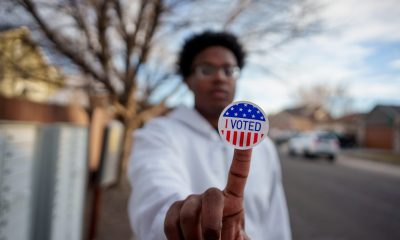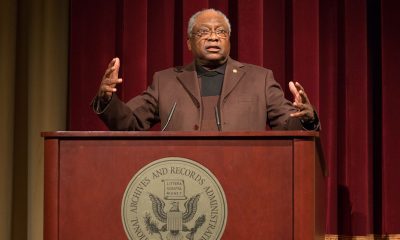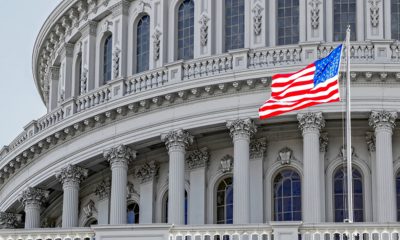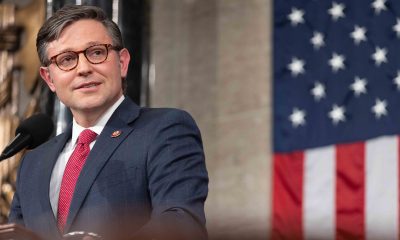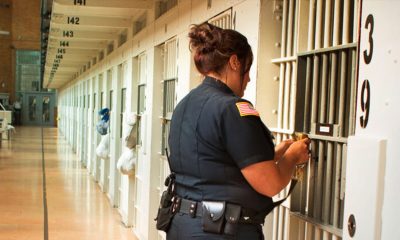Commentary
“Big Sister” Barbara Lee’s Advice for the New Women of Color in Congress
NNPA NEWSWIRE — “…there have been vocal women of color pushing for progressive change in Congress for a long time. California Rep. Barbara Lee, who Pressley called a ‘big sister & mentor’ in her tweet, is one of them.”
“You have to break through all of that sexism and racism. You have to really confront that all of the time.”
By Christina Cauteruci
There’s a crew of new women in Congress who’ve become fast friends since the election. Reps. Rashida Tlaib, Ayanna Pressley, Ilhan Omar, and Alexandria Ocasio-Cortez have become instant progressive icons and visible markers of a long-overdue shift in legislative demographics. They’ve posted loads of selfies together, called themselves a “squad,” tweeted support for each other’s policy ideas, and defended each other from right-wing detractors. Their fans have seen them as harbingers of hope in a dark time descending on a stalled-out Congress to help save America from itself.
It’s important to remember, though, as Pressley told her Twitter followers over the weekend, that there have been vocal women of color pushing for progressive change in Congress for a long time. California Rep. Barbara Lee, who Pressley called a “big sister & mentor” in her tweet, is one of them. In a phone conversation earlier this month, I spoke to Lee about her role in the new, more progressive Congress, what it was like to be one of the few black women in national office in the 1990s, and what it might mean to have a “critical mass” in the legislature. Our conversation has been condensed and edited for clarity.
Christina Cauterucci: I was looking through all the pictures you and other Democratic women posed for on the first day of the new Congress, and there was a palpable feeling of celebration. What was that day like for you?
Barbara Lee: It was exciting. The younger and new members of Congress are very smart, they’re authentic, they’re passionate, they’re committed to their constituencies and to the country, to the world. And it’s just been wonderful being with them. I hope to be able to help them find their paths.
But also, I have to say, just as a progressive African-American woman, they give me a lot of hope. They strengthen me. They really formed that bond that means a heck of a lot when you’re in a Congress where—for example, in 1998, I was only the 20th African-American woman ever elected to Congress since 1789. So this is really quite a happy moment and a really profound and positive development for the country.
There seems to be an incredible camaraderie among this new class of congresswomen—they’re hugging each other in photos, calling each other sisters in their tweets. Is there always such a strong feeling of solidarity among new progressive members of Congress?
There’s always solidarity. But I think this year is unique because you have so many women of color, and women from diverse backgrounds, and women who have broken so many glass ceilings. For example, Pennsylvania did not have one single woman in their delegation. Now we have—I believe it’s four. This is amazing. This is groundbreaking. It really tells me there’s no way we can ever go back. I think the excitement and the joy and the hope that this election brought was really a special and unique moment in history.
I’ve been thinking a lot about power in numbers when it comes to race and gender representation in Congress. Some studies of women in business leadership suggest that there needs to be a critical mass of people from underrepresented groups to make a tangible difference, because one person alone can be more easily ignored or tokenized. Does that resonate with your experience in Congress?
Absolutely. You know, it’s really good to have allies. And coming to Congress then, as a progressive African-American woman, it took a while to build the level of collegiality that others have, especially white men, because there were so few of us.
In terms of speaking out in a meeting or at a hearing with new ideas—folks would shake their heads and say “Great,” or whatever. Then 10 minutes later they would reiterate the same thing I just said, as if it were new. [Laughs.] It’s just like being invisible. You know what that’s like, being invisible? But let me tell you: I wasn’t gonna let that happen. I was working for former Congressman Ron Dellums, who passed away in July. And when I started working as a chief of staff on Capitol Hill, there were maybe two African-American women as chiefs of staff, OK? Maybe three, but I think it was two. I had to represent Ron at meetings with Cabinet officials. And I’d walk into those meetings, and primarily white men were there, and I would engage in the meeting, and it was almost like I just wasn’t there. Or they didn’t recognize me as a chief of staff, or they would never call on me to ask my question or make my point. Or they sometimes didn’t know that I was a chief of staff, they thought I was another staffer just taking notes to take back to the congressman. You know, it was very ugly and demeaning, disrespectful.
So I remember those days, and we’ve made a lot of progress, but let me tell you, we have a long way to go. You still have institutional biases, you have to break through all of that sexism and racism. You have to really confront that all of the time, whether it’s subconscious or conscious.
[Congress is] still just a microcosm of America. It takes a while. But I think that we’re moving forward, we’re making progress. With this new Congress, you know, it’ll never go back to the days of long ago, when Shirley Chisholm, the first African-American congresswoman, was elected in the late ’60s.
You know what it’s like to stand alone on an issue—I’m thinking specifically of your vote against the Authorization for Use of Military Force in 2001. [Ed. note: Lee was the only member of Congress to vote against the broad, still-active authorization of war.] What advice are you giving new members of Congress on speaking up, even if they’re alone?
I think they all are very courageous and all have to know their bottom lines, what they bring to Congress, their values, who they are, and what they stand for. And it may not be the same thing, but you have to know how far to go for compromise, or how far you will allow yourself to go on any given issue. For me, as a daughter of veteran and someone whose dad was in World War II, Korea, and who was raised in a military family, I know that the use of force should only be the last option, recognizing that we have to make sure that our national security is secure. So for me, that’s a bottom line.
For me, another bottom line is you do not cut public assistance and food stamps. I had a very difficult period in my life—I was a single mother with two young sons. And I was on welfare and food stamps and Medicaid. And I knew what it was like, and it was really hard. But in that moment because I had this bridge over troubled waters, like a lifeline, I’m not gonna allow, on my watch, my involvement in cutting any of this basic support for people and families and children who need it. And I’m gonna look out for others who may be in similar circumstances. So that’s a bottom line for me.
[The new members of Congress] come with a lot of courage. Just to get here took a lot of courage—to break through, given the fundraising barriers and everything that you have to deal with. But now they’re here, and they’ve demonstrated how courageous they are. They just have to know how far they’re willing to compromise and what they stand for. And I think most of them know that.
How do you see your role in this wave of new progressive women, especially women of color, taking seats in Congress?
I hope I am a supportive peer who can really help them navigate the legislative process, and do exactly what they want to do in their congressional career—serving their constituents and how they want to go, what path they want to take. And now as a co-chair of the Steering and Policy Committee, I want to make sure they’re able to get to the committees that they want—to carve out what issues they want to address. In terms of the seniority system and how you navigate that—I’ve had a lot of experience … [with] ways to think out of the box and be creative in what I want to do when there are systemic and institutional kinds of roadblocks.
So I want to help [new members of Congress] figure those out. But also, I have to tell you: They encourage me, and they give me a lot of insight, and I learn a heck of a lot from them. It goes both ways.
Activism
Oakland Post: Week of April 17 – 23, 2024
The printed Weekly Edition of the Oakland Post: Week of April 17 – 23, 2024

To enlarge your view of this issue, use the slider, magnifying glass icon or full page icon in the lower right corner of the browser window. ![]()
Commentary
Opinion: Surviving the Earthquake, an Eclipse and “Emil Amok.”
Last Friday, a 4.8 magnitude earthquake shook New York City, reported as the “biggest earthquake with an epicenter in the NYC area since 1884” when a 5.2 quake hit. A bit bigger. The last quake similar to Friday’s was a 4.9 in 1783.Alexander Hamilton felt it — 241 years ago. That’s why New Yorkers were freaking out on Friday. They were in the room where it happens.

By Emil Guillermo
I’m a Northern Californian in New York City for the next few weeks, doing my one-man show, “Emil Amok, Lost NPR Host, Wiley Filipino, Vegan Transdad.”
I must like performing in the wake of Mother Nature.
Last Friday, a 4.8 magnitude earthquake shook New York City, reported as the “biggest earthquake with an epicenter in the NYC area since 1884” when a 5.2 quake hit. A bit bigger. The last quake similar to Friday’s was a 4.9 in 1783.
Alexander Hamilton felt it — 241 years ago.
That’s why New Yorkers were freaking out on Friday. They were in the room where it happens.
And it just doesn’t happen that often.
Beyonce singing country music happens more frequently.
When I felt New York shake last week, it reminded me of a time in a San Francisco TV newsroom when editors fretted about a lack of news an hour before showtime.
Then the office carpeting moved for a good ten seconds, and the news gods gave us our lead story.
On Friday when it happened in NYC, I noticed the lines in the carpeting in my room wiggling. But I thought it was from a raucous hotel worker vacuuming nearby.
I didn’t even think earthquake. In New York?
I just went about my business as if nothing had happened. After living near fault lines all my life, I was taking things for granted.
Considering the age of structures in New York, I should have been even more concerned about falling objects inside (shelves, stuff on walls) and outside buildings (signs, scaffolding), fire hazards from possible gas leaks, and then I should have looked for others on my floor and in the hotel lobby to confirm or aid or tell stories.
Of course, as a Californian who has lived through and covered quakes in the 4 to 6 magnitude range, I tried to calm down any traumatized New Yorker I encountered by taking full responsibility for bringing in the quake from the Bay Area.
I reassured them things would be all right, and then let them know that 4.8s are nothing.
And then I invited them to my consoling post-Earthquake performance of “Emil Amok, Lost NPR Host…”
It was the night of the eclipse.
ECLIPSING THE ECLIPSE
In New York City, the eclipse was about 90 percent visible. Good enough for me. Though a full solar eclipse is a celestial rarity, blockages of any sort aren’t generally celebrated. My one-man play is about growing up with the eclipsed history of American Filipinos and how I struggle to unblock all that.
For example, did you know the first Filipinos actually arrived to what is now California in 1587? That’s 33 years before the Pilgrims arrived in America on the other coast, but few know the Filipino history which has been totally eclipsed.
I was in Battery Park sitting on a bench and there was a sense of community as people all came to look up. A young woman sitting next to me had a filter for a cell phone camera. We began talking and she let me use it. That filter enabled me to take a picture of the main event with my iPhone.
For helping me see, I invited her and her boyfriend to come see my show.
Coincidentally, she was from Plymouth, Massachusetts, near the rock that says the year the Pilgrims landed in 1620.
In my show she learned the truth. The Pilgrims were second.
History unblocked. But it took a solar eclipse.
Next one in 2044? We have a lot more unblocking to do.
If you’re in New York come see my show, Sat. April 13th, 5:20 pm Eastern; Fri. April 19, 8:10 pm Eastern; and Sun. April 21st 5:20 pm Eastern.
You can also livestream the show. Get tickets at www.amok.com/tickets
About the Author
Emil Guillermo is a journalist and commentator. He does a mini-talk show on YouTube.com/@emilamok1. He wishes all his readers a Happy Easter!
Commentary
Commentary: Republican Votes Are Threatening American Democracy
In many ways, it was great that the Iowa Caucuses were on the same day as Martin Luther King Jr. Day. We needed to know the blunt truth. The takeaway message after the Iowa Caucuses where Donald Trump finished more than 30 points in front of Florida Gov. De Santis and former South Carolina Governor Nikki Haley boils down to this: Our democracy is threatened, for real.

By Emil Guillermo
In many ways, it was great that the Iowa Caucuses were on the same day as Martin Luther King Jr. Day.
We needed to know the blunt truth.
The takeaway message after the Iowa Caucuses where Donald Trump finished more than 30 points in front of Florida Gov. De Santis and former South Carolina Governor Nikki Haley boils down to this: Our democracy is threatened, for real.
And to save it will require all hands on deck.
It was strange for Iowans to caucus on MLK day. It had a self-cancelling effect. The day that honored America’s civil rights and anti-discrimination hero was negated by evening.
That’s when one of the least diverse states in the nation let the world know that white Americans absolutely love Donald Trump. No ifs, ands or buts.
No man is above the law? To the majority of his supporters, it seems Trump is.
It’s an anti-democracy loyalty that has spread like a political virus.
No matter what he does, Trump’s their guy. Trump received 51% of caucus-goers votes to beat Florida Gov. Ron DeSantis, who garnered 21.2%, and former South Carolina Gov. Nikki Haley, who got 19.1%.
The Asian flash in the pan Vivek Ramaswamy finished way behind and dropped out. Perhaps to get in the VP line. Don’t count on it.
According to CNN’s entrance polls, when caucus-goers were asked if they were a part of the “MAGA movement,” nearly half — 46% — said yes. More revealing: “Do you think Biden legitimately won in 2020?”
Only 29% said “yes.”
That means an overwhelming 66% said “no,” thus showing the deep roots in Iowa of the “Big Lie,” the belief in a falsehood that Trump was a victim of election theft.
Even more revealing and posing a direct threat to our democracy was the question of whether Trump was fit for the presidency, even if convicted of a crime.
Sixty-five percent said “yes.”
Who says that about anyone of color indicted on 91 criminal felony counts?
Would a BIPOC executive found liable for business fraud in civil court be given a pass?
How about a BIPOC person found liable for sexual assault?
Iowans have debased the phrase, “no man is above the law.” It’s a mindset that would vote in an American dictatorship.
Compare Iowa with voters in Asia last weekend. Taiwan rejected threats from authoritarian Beijing and elected pro-democracy Taiwanese vice president Lai Ching-te as its new president.
Meanwhile, in our country, which supposedly knows a thing or two about democracy, the Iowa caucuses show how Americans feel about authoritarianism.
Some Americans actually like it even more than the Constitution allows.
About the Author
Emil Guillermo is a journalist and commentator. He does a mini-talk show on YouTube.com/@emilamok1.
-

 Activism4 weeks ago
Activism4 weeks agoOakland Post: Week of March 20 – 26, 2024
-

 #NNPA BlackPress3 weeks ago
#NNPA BlackPress3 weeks agoCOMMENTARY: D.C. Crime Bill Fails to Address Root Causes of Violence and Incarceration
-

 #NNPA BlackPress3 weeks ago
#NNPA BlackPress3 weeks agoMayor, City Council President React to May 31 Closing of Birmingham-Southern College
-

 #NNPA BlackPress3 weeks ago
#NNPA BlackPress3 weeks agoCOMMENTARY: Lady Day and The Lights!
-

 #NNPA BlackPress3 weeks ago
#NNPA BlackPress3 weeks agoFrom Raids to Revelations: The Dark Turn in Sean ‘Diddy’ Combs’ Saga
-

 #NNPA BlackPress3 weeks ago
#NNPA BlackPress3 weeks agoBaltimore Key Bridge Catastrophe: A City’s Heartbreak and a Nation’s Alarm
-

 #NNPA BlackPress3 weeks ago
#NNPA BlackPress3 weeks agoBaltimore’s Key Bridge Struck by Ship, Collapses into Water
-

 Activism3 weeks ago
Activism3 weeks agoOakland Post: Week of March 27 – April 2, 2024




